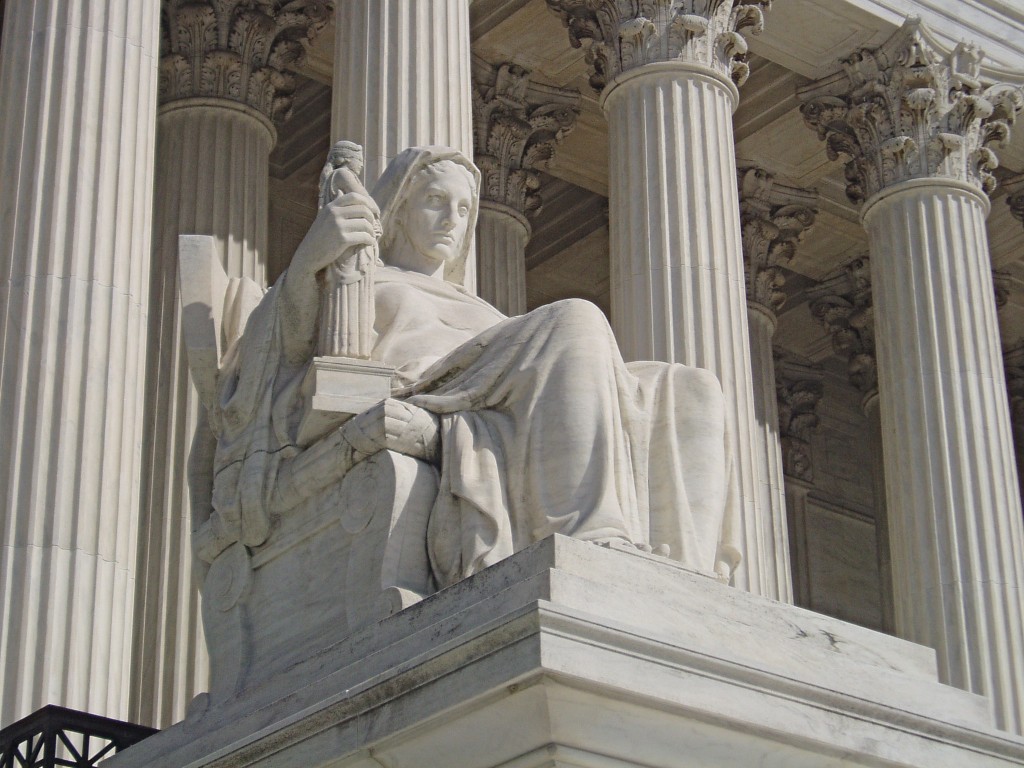Why is Donald Trump Popular?
August 5th, 2015 // 3:52 pm @ Oliver DeMille
by Oliver DeMille
The Factor
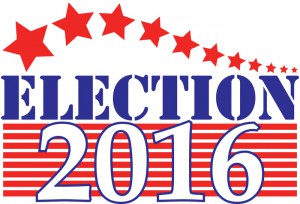 First of all, dig into the polls and it’s clear that a lot of the media reports about Trump are inaccurate. Specifically, he has significant support across the socio-economic spectrum, not just among white, low-income males. Second, the reports that a number of those polled say they’ll never vote for him aren’t as strong as first supposed, because this number is falling over time. And the people who initially called him a clown aren’t laughing anymore.
First of all, dig into the polls and it’s clear that a lot of the media reports about Trump are inaccurate. Specifically, he has significant support across the socio-economic spectrum, not just among white, low-income males. Second, the reports that a number of those polled say they’ll never vote for him aren’t as strong as first supposed, because this number is falling over time. And the people who initially called him a clown aren’t laughing anymore.
Still, most people in the media and the nation don’t believe he’ll be the next president. To be fair, this number is decreasing as well.
But whatever you think about Donald Trump, however much you like or dislike him as our potential president, it’s worth thinking about why he is striking a chord among a number of Republicans and Right-leaning independents.
The media says he is popular because many voters are angry at Washington, that they like his straight talk, that they are tired of politicians, that he attacks the political class that so many people now dislike. All of these observations are true, but they don’t quite get to the heart of the matter. They are all symptoms, not the root cause.
Yes, Trump is popular because he doesn’t sound like Washington politicians, because he criticizes Washington, because he talks about American greatness, because he warns of foreign enemies, and because he talks loudly about issues Washington hasn’t fixed. But there’s more to it.
Cause and Effect
There’s a prior reality that has Republicans and many independents upset, and the only way to understand the support for Trump is to clearly understand this prior concern. Perhaps it is summed up best by two former enemies of the United States:
“The United States brags about its political system,
but the President says one thing during the election, something
else when he takes office, something else at midterm
and something else when he leaves.”
—Deng Xiaoping
“People never lie so much as after a hunt, during a war
or before an election.”
—Bismarck
Many on the Right now support Trump precisely because they are angry at two groups of people:
- Recent Republican presidential candidates who promised to change things but failed to make it stick, particularly John McCain and Mitt Romney—and any who talk like or even seem to be following the same path, such as Jeb Bush, Chris Christie, Scott Walker, etc.
- Republican members of Congress who promised to change things but failed to do so.
Many such voters are fond of Trump because they are very upset with Republicans who they believed “lied” to get into office in 2010, 2012, and 2014 by promising to repeal Obamacare, reverse the trajectory of the national debt, and secure the Southern border, and then didn’t do any of these things. These members of Congress could have used their power of the purse to defund Obamacare, but the Republican leadership in the House and Senate blocked it.
Many on the Right believe that such defunding, even it required government shutdowns, would have worked if Republicans had just stuck to their guns.
They could have used their power of the purse to defund massive government spending on a number of projects (which is precisely what they promised to do in the 2010, 2012, and 2014 elections), but the Republican leadership in the House and Senate blocked this as well. When things got hard, the Republicans didn’t stand strong.
Political Necessities
In the estimation of many voters, the Republicans lied. They promised to do specific things if elected, they were elected on the weight of these promises, they had the power to fulfill their promises by taking hard action, and then they didn’t do what they’d promised.
As a result, for a number of Republican and Right-leaning independent voters, the brand of “Republican Politicians” is drastically weakened. Moreover, it is the specific lack of committed and intense fight among Republicans in Congress and Republican presidential nominees that infuriates many voters.
Their take on it goes something like this: “McCain, Romney, Boehner, McConnell, and other leading Republicans tried to be popular with their peers in Washington, tried to sound moderate and reasonable to the national press, tried to look presidential instead of just focusing on results, and refused to take off their gloves and really fight for us—and as a result, they got trounced at every turn by Obama, Pelosi, and Reid. By extension, we all got it handed to us by Russia, China, Libya, ISIS and now Iran. That’s not what America is supposed to do.
“So, clearly, we need a different kind of leader, a non-politician, someone who is brash, intense, and a real fighter. The more he’s a true brawler who can push hard and win, and who won’t give up no matter what his opponents and the media say, the better. We don’t care about all the normal things we ask of our politicians. We’re in a battle, a big one, and we want to win. Let’s find someone who is a great fighter and give him the reins.
“We also need someone who will actually follow through once elected and do what he or she said during the campaign. Who will back it up with action. Someone who will actually repeal Obamacare, who will actually stand by Israel, who will actually secure the Southern border, who will end our glut of business-killing regulations and get our economy booming again, and who will truly, literally reverse the national debt and get the debt clock counting down. Nothing else will do.”
This is why Trump is popular. Say whatever else you want about him, but he clearly meets the first criterion: he is brash, intense, loud, outspoken, non-politically correct, and a bold fighter. Trump also seems poised to meet the second criterion as well: many voters think he’s a lot more likely to actually repeal Obamacare, secure the border, reverse the national debt, and reboot the economy than any of the career politicians in the race.
The Coming Decade
One thing is certain: Trump brings out people’s passion about politics. People seem to either love him or hate him; few are ambivalent. What this intense passion will bring about between now and election night in 2016 remains to be seen. It may expand, or it may dwindle.
But the widespread and growing frustration with electing officials who promise to repeal Obamacare and reverse our national debt–and then don’t effectively fight against every obstacle and get these things done, once and for all–isn’t going away anytime soon. If Bush, Walker, Christie or any other establishment Republican wins in 2016, or if the race goes to Clinton, Biden, or Warren, for example, this anti-status-quo fervor on the Right will only intensify in the years ahead.
Whether or not you like Donald Trump, the real news is that a rising number of voters are passionately demanding elected leaders who actually get the right things done. The niceties of “acceptable” public discourse and many of the traditions of politics (such as trying to “look presidential” or keep the “tone” presidential) are giving way to a stark drive for tangible results. It started with the Tea Parties, and now it is spreading to many other voters.
Make no mistake: this passion on the Right for real results is mounting, and it may very well become the defining trait of politics for decades to come.
Category : Blog &Citizenship &Culture &Current Events &Generations &Government &Independents &Leadership &Politics
A Parable On Education and Freedom
July 30th, 2015 // 1:04 pm @ Oliver DeMille
Lines and Questions
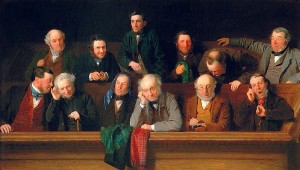 I was in a long line at WalMart, and I started talking with the man standing next to me. We spoke about a number of topics, including politics, and in passing I mentioned that except for military and law enforcement, private enterprises are always better than government programs. He took issue with this, arguing that the government does most things better than private entities.
I was in a long line at WalMart, and I started talking with the man standing next to me. We spoke about a number of topics, including politics, and in passing I mentioned that except for military and law enforcement, private enterprises are always better than government programs. He took issue with this, arguing that the government does most things better than private entities.
When I pressed him on this, he said that of course Washington does things better than people or businesses, because the government can keep spending as much as it wants until it gets things right.
I just stared at him.
“Seriously? It can just keep spending as much as it wants until it gets things right? That’s your big argument for the effectiveness of government?”
“Of course,” he replied. Then seeing the look of amazement and incredulity on my face, he asked, “Why? What’s wrong with that?”
“You realize that your model wastes a lot of our money, right?”
“Sure, but so what? I don’t make much, so I don’t pay much in taxes. Other people pay for government programs, so why should I care?”
I shook my head. Then I asked, “Okay, but tell me: what programs has the government got right?”
Over and Under
He cocked his head and tried to think of some.
After a bit he laughed. “Well, that’s why we’ll just have to keep trying.”
My amazement grew.
I told him the following statistics I had just seen on a news broadcast of Special Report:
Between 2008 and 2013 the Social Security Administration overpaid people in the amount of $128.3 million. That’s quite a chunk of taxpayer money. To right this wrong, the government went after these overpayments and managed to recover $109.4 million.
That’s pretty good, right? Not totally efficient, but not bad.
Then the rest of the information came out. The cost of recovering this money [just over $100 million] was $323 million, making the total loss for the taxpayers a huge amount: $213.6 million plus $18.9 million in overpayments.
That’s incredible.
Go back and look over these numbers again. It’s just plain amazing!
I could see that even the man in line thought this was ridiculous. He shook his head and sighed. “Well, we’ve got a long way to go…”
It was his turn to check out, so we left it at that.
I wonder if he votes? Or serves on juries?
Education of our citizens matters.
Category : Blog &Citizenship &Community &Culture &Current Events &Economics &Education &Featured &Generations &Government &Leadership &Liberty &Mini-Factories &Politics &Statesmanship
A Proposal on Reforming the Supreme Court
July 28th, 2015 // 8:12 am @ Oliver DeMille
by Oliver DeMille
I don’t mean it. I’m going to propose it, but I don’t really want it. Or think it’s a good idea. This proposal is meant to be ironic. But it still needs to be said, because there is far too much truth to it.
Supreme Parliament of the United States
 In the wake of recent Supreme Court decisions, it’s clear that the Court doesn’t just try cases. It now writes law. It isn’t only a Supreme Court, it’s the de facto Supreme Parliament of the United States as well.
In the wake of recent Supreme Court decisions, it’s clear that the Court doesn’t just try cases. It now writes law. It isn’t only a Supreme Court, it’s the de facto Supreme Parliament of the United States as well.
The Court uses some decisions to simply rewrite the laws of the nation, including the laws of the states. It’s been doing that for some time,[i] of course, but now it’s taking this approach to a whole new level. It has decided that the 9th and 10th Amendments are outdated, and it just ignores them.
For example, the Court labels Obamacare a “tax”, even though the Congress and President who proposed and passed it never called it that, and even though it skirts many state laws. The Court just makes up its own way.
Forget the actual case at hand; the Court is convinced that it has the power to create whatever it chooses out of thin air. Whatever the Court says, goes. Call it a “tax”. And call marriage a Constitutional right, even though the word “marriage” and the concept of marriage are never even mentioned in the Constitution or any of the Founder’s commentaries on the federal Constitution.
The Framers specifically left any and all decisions about marriage to the states. The Court has amended the Constitution without even using an official amendment.[ii] Many times. Just because it wants to.[iii] I’m not saying the Court got any of these recent decisions wrong, or right. That’s not my point. In fact, my point is much more important than any of these cases. I’m saying the Court has no authority in the Constitution to make many of its decisions.[iv]
It gave itself the power to do these things.[v] It just took the power. Such power didn’t come from the people or the Constitution.[vi] Such power isn’t legitimate authority. It is, to use the precise, technical word that the Founding generation used for this exact behavior: “tyranny”.
Whether you love the current Court’s decisions, hate them, or fall somewhere in the middle, the bigger picture is beyond the cases. The Court is now boldly and fully engaged in Judicial Tyranny.[vii]
The new rules of the Court: Just do whatever you want. You’re the Court, after all. Oh, and that pesky reality that the Constitution doesn’t give the Court the authority do more than half of what it now does? No problem. Since you’re the Court, just announce that the Constitution does, in fact, give you such authority. In fact, decree that the Court has the Constitutional authority to do whatever you decide to do.
Jefferson warned that this very thing was the biggest danger to the Constitution and to American freedoms. And his prediction has come true. The Legislative Court has become one of the greatest dangers to our freedoms. Five lawyers literally have the power to do whatever they want.
The Proposed Change!
So here’s the proposal. I heard it on a radio show, and it made me laugh. Then it made think. Then it made me mad. Check this out:
Since the Supreme Court now makes up any law it wants just by writing it up in a majority opinion, without bothering about what the House or Senate does, let’s balance the budget by just disbanding Congress. Why pay Representatives and Senators and their staff when the Court is just going to write up laws on its own anyway?
That’s the proposal. Let’s just get rid of Congress and let the Court keep doing its thing.
Again, I don’t really mean it. But at this rate, the Court is on pace to do this anyway. And in the meantime, it’s already behaving as the Supreme Court and the Supreme Parliament all in one.
One More Thing
By the way, the real solution is for Congress to pass legislation ending the use of precedent in the courts and limiting every Supreme Court decision to the scope of that one case. This will send many in the current generation of lawyers into a tizzy, but it’s the right thing to do. Assuming that we want to remain free. Such a change will immediately return the Court to its Article III powers.
Or, barring this solution, if we’re going to keep with the bad tradition of common law precedent,[viii] amend the Constitution so that 2/3 of the state Supreme Courts can overturn any decision of the Supreme Court. (More on Common Law in footnote “viii”.)
If we don’t do one of these, we literally might as well adopt the proposal above—because the Court is now operating as both the Judicial Branch and a Higher Legislative Branch.
NOTES
[i] See, for example: Martin v. Hunter Lessee; Cohen v. Commonwealth of Virginia; McCullough v. Maryland; Gibbons v. Ogden; Missouri v. Holland; New York ex rel. Cohn v. Graves; U.S. v. Butler; U.S. v. Curtiss-Wright Export Corp.; Wood v. Cloyd W. Miller; among others. See also: Bruno Leoni, Freedom and the Law, 3-25, 133-171.
[ii] Compare Article VI of the United States Constitution to Article III.
[iii] Some scholars and jurists will balk at this, arguing instead that the court “finds” or “discovers” the Constitutional meaning in the law. But while the Court may employ technical and/or logical language to support its decisions, it still utilizes its will. It may claim that its decisions are “findings,” and at times they are, but they are still always decisions. (If they were truly “findings,” matters of law without personal choice, all cases would be decided by 9-0 votes. Will is part of each decision.) Moreover, despite what is taught in some law school courses, the Framers clearly understood votes of the Justices to be acts of will, not mechanized requirements demanded by the laws.
[iv] Read Article III word for word. No such powers are granted.
[v] Review the cases listed in footnote “i” above. See also: John E. Nowak, Ronald D. Rotunda (Thompson-West), Constitutional Law, Seventh Edition, pp. 1-16, 138-156, 397-398.
[vi] Article III.
[vii] See how Raoul Berger warned of this a generation ago: Raoul Berger, Government by Judiciary.
[viii] Many in the legal profession argue that the Framers preferred Common Law to the other alternatives. Certainly there are a number of quotes from prominent founding leaders that on face value seem to support this view. In reality, most of the Framers preferred Common Law to Romano-Germanic Codifications. This was the major legal debate of the era, in Europe at least. Thus the Justinian model was soon to be followed by the Napoleonic Code. So when the Framers sided with Common Law over the Romano-Germanic model it was taken as a blanket endorsement of the Common Law. However, some of the top Founding Fathers, including both Jefferson and Madison, preferred a third model, the Anglo-Saxon code and system, over Common Law. For excellent background on these competing systems, see: Rene David and John E. C. Brierley, Major Legal Systems in the World Today; John William Burgess, The Reconciliation of Government with Liberty; Theodore F.T. Plucknett, A Concise History of the Common Law. In short, common law builds on precedent; the Constitution the Framers wrote didn’t require the use of precedent by the Judiciary. In the Framer’s model, the Court was “supreme” in deciding any one case. Period. This keeps the Court separated in the judicial realm. It is an independent judiciary, unlike in Britain, because it has sole authority to provide the final determination in any one case. But separation of powers gives it no authority to use dicta or precedent to influence later cases. Any allowance of precedent creates the need to explain a decision, and moves into the realm of legislation. Common Law was not the intent of the Framers. Once the Constitution was ratified, however, the attorneys of the era, trained in the Common Law, simply kept practicing their system without change. The Anglo Saxon code and model was quickly lost, to the detriment of American freedom. Most attorneys are unaware of this. Even a lower percentage of non-attorney citizens understand this. We lose our freedoms in many cases simply because we don’t know better.
Category : Aristocracy &Blog &Citizenship &Community &Constitution &Current Events &Education &Generations &Government &History &Leadership &Liberty &Politics &Statesmanship
Two Possible Surprises: A Potential Twist in the 2016 Election
June 18th, 2015 // 11:48 am @ Oliver DeMille
News after News
If Elizabeth Warren runs for president in 2016, it will change the whole dynamic of the election. So far she has said she’s not running, but we’ve heard that before from politicians who later changed their minds.
Since she first told everyone she isn’t going to run, a lot has happened. For example, the Right has visited an onslaught of negative press on Hillary Clinton. It’s been one criticism after another. Whether the stories are justified or not, this approach by the Right is news. As soon as one story dies down in the press, the Right pushes another one.
It’s a kind of shock and awe approach to negative politics. Break one story, let it run its course, fuel it as much as possible, and be ready to put out the next story when the current one starts to lose steam. If it’s not Benghazi, it’s Server-Gate. Then foreign donations to the Clinton Foundation. Followed by ducking reporters. Or FIFA.
The list is long and growing. No doubt Mrs. Clinton’s critics have an even longer list of additional news stories planned and ready to come out (especially now that her old emails will be released a few at a time for many months ahead).
As this continues, Clinton’s support may eventually take a more significant hit than it has so far. And she’s already down a bit in the polls.
But Democrats aren’t very worried. Mrs. Clinton is still very popular, and if something big comes up that derails her candidacy, there’s always Elizabeth Warren.
The Deal
In many ways Senator Warren is a stronger candidate than former-First Lady/Senator/Secretary Clinton. She has fewer enemies, and her name doesn’t open the bank accounts of Right-Wing donors like Hillary’s does. Warren isn’t weighed down by a huge, national negative legacy from the past like Hillary—no Bill, no Benghazi, no Clinton Foundation, no sense of “the Clintons have their own set of rules”.
And Warren isn’t closely associated with President Obama like Hillary. In fact, Warren is known by many Americans mainly for standing against Obama and getting him to argue with her publicly. This makes many independents sit up and take notice. In fact, in recent polling over 60% of independents say they don’t trust Mrs. Clinton.
Beyond these things, Warren commands nearly all the positives for a candidate that Hillary enjoys: strong support among women, minorities, youth, and the Democratic base. She is well liked in swing states, she is known as more politically liberal than Hillary, and she is portrayed in the media as tough, independent, and dedicated.
Warren is an excellent public speaker, a mix of fiery and thoughtful, and, if anything, she’s more believable than Clinton.
In a sense, Warren is the anti-Obama of the Democratic Party. She could easily become the anti-Hillary in the presidential primaries, or the post-Hillary rescuer of the Party if Hillary hits a major scandal or roadblock.
In short, Warren is the real deal. She’s “legit,” as today’s youth like to say. I personally disagree with her on many political issues, but I’m impressed with how she’s running her campaign for president in 2016.
Playing ‘What If’
True: officially there is no such campaign. But if there were, she’s doing exactly the savvy thing right now:
- keep getting President Obama to mention you and sometimes argue with you
- say you’re not going to run and let the Right spend its money, time and energy tearing down Hillary
- keep using your position in the Senate to weigh in on important American issues and look increasingly like a leader
- stay out of the political fray and stick to governing for as long as possible—letting the host of Democratic and Republican candidates wear each other down
If she runs, she’ll almost certainly cause the Republican candidates more problems in the 2016 election than Hillary Clinton would.
With all that said, John Kasich may be the Elizabeth Warren of the Republican field. His role as Governor of Ohio gives him support in a vital swing state, and his rough-and-tumble record and disarming approach could be popular among many other swing voters as well.
Both Warren and Kasich have the “Credible” factor and the “Cool” thing going for them—they don’t come across so much like politicians as the other current presidential candidates. Many voters’ experience with Warren and Kasich is that they’re the “grown-ups” in current politics.
Whether you agree or disagree, and however you feel about their politics, Elizabeth Warren and John Kasich are worth watching in the next twelve months. Either one, or both, could be a surprise major player in 2016.
*Image Credit, Tim Pierce. Original>>
Category : Blog &Citizenship &Community &Culture &Current Events &Featured &Government &Independents &Leadership &Politics
An Obama, Adams, and Jefferson Debate
June 1st, 2015 // 6:15 pm @ Oliver DeMille
(Should Presidents be Treated Like Royalty?)
News and Fans
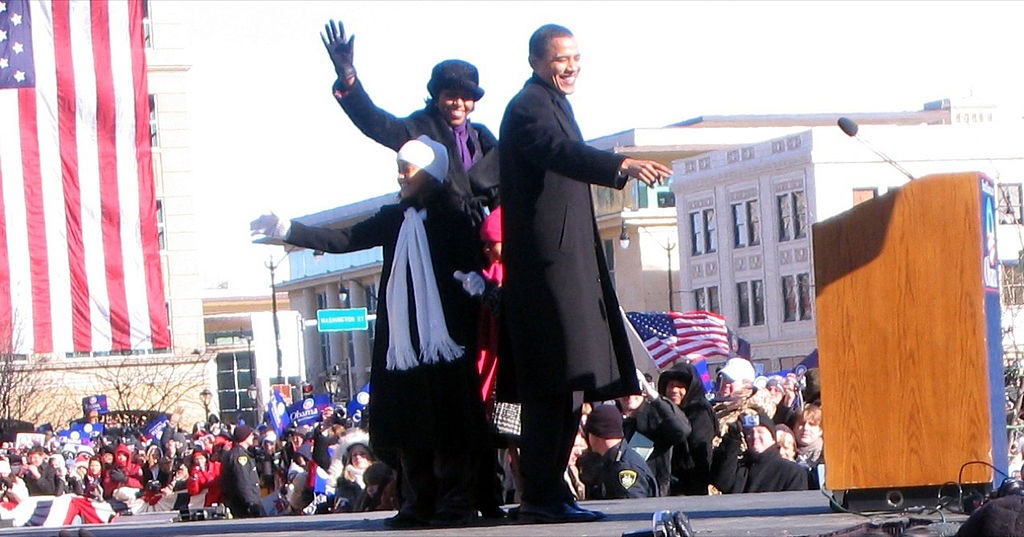 A strange thing happened recently. President Obama visited my state, just a quick flight and a few meetings. But to watch the state news reports, you would think the most important celebrity in all of history was visiting. The media simply fawned over the president. The news channels broke into all the nightly television programs and gave special reports. Not on some major announcement, but on…wait for it…the President arriving at his hotel.
A strange thing happened recently. President Obama visited my state, just a quick flight and a few meetings. But to watch the state news reports, you would think the most important celebrity in all of history was visiting. The media simply fawned over the president. The news channels broke into all the nightly television programs and gave special reports. Not on some major announcement, but on…wait for it…the President arriving at his hotel.
Reporters were on the scene. Anchors cut back and forth between the reporters and expert guests opining on how long the President’s day flight been and how much longer before he would arrive at the hotel. This went on and on. No news. No policies. No proposals. No events. No actual happenings.
Just a president and his entourage arriving in a plane, being driven to the hotel, and staying overnight. The reporters and other news professionals—on multiple channels—were positively giddy.
I shook my head in amazement. The American founders would have been…well, upset. At least Jefferson would. Adams? That’s a different story altogether. In fact, it got me thinking.
John Adams, the second president of the United States, made a serious mistake during his term in office. He had served for a long time as ambassador to the English crown, and he picked up some bad habits in London. He witnessed the way members of Parliament treated the top ministers in the British Cabinet, and how the ministers themselves fawned over the King.
He had, likewise, watched how the regular people in England bowed and scraped to the aristocracy. Almost everyone in Britain saw every other person as either a superior, an inferior, or, occasionally, an equal. This class system dominated the culture.
And, as an ambassador of the American colonies, Adams had been pretty low on the pecking order in London. He had seen how this aristocratic structure gave increased clout to the King, to Cabinet members, and to the aristocrats. So when he became president, he wanted the U.S. Presidency to have this same sense of authority, power, and awe.
In fairness, reading between the lines, I think president Adams’ heart was in the right place: He thought this would help the new nation gain credibility in the sight of other nations. He wanted the president to be treated like royalty.
But Adams forgot something very important.
Aristos and Servants
Americans weren’t raised in such a class system. They found such bowing-and-scraping to the aristos both offensive and deeply disturbing. For them, this was one of the medieval vestiges of the old world that America (and Americans) had gratefully left behind. The principle behind this was simple: if we treat leaders like aristos and kings, they’ll start acting like aristos and kings, and our freedoms will be in grave danger.
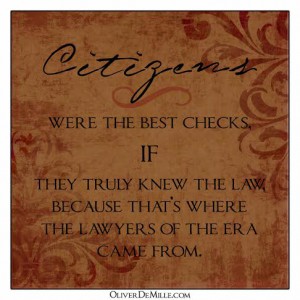 Moreover, Americans felt that such “prostration before their betters” was especially inappropriate where government officials were concerned. “Government leaders work for us,” was the typical American view. And if the citizens start acting like their leaders are aristocrats and royalty, they’ll stop thinking and acting like fiercely independent free citizens.
Moreover, Americans felt that such “prostration before their betters” was especially inappropriate where government officials were concerned. “Government leaders work for us,” was the typical American view. And if the citizens start acting like their leaders are aristocrats and royalty, they’ll stop thinking and acting like fiercely independent free citizens.
But still Adams wanted the people to treat the president like royalty. Jefferson was appalled at Adams’ words and behavior in this regard, and his criticisms of President Adams’ on this matter fueled a rift between these two men that lasted almost two decades. At times, the biting rivalry and harsh words bordered on hatred—if not of each other, certainly of the other’s behavior.
Jefferson believed in a democratic culture, where each person would be judged by his choices and character—not by class background. Even more importantly, he believed that, in fact, government officials do work for the people—and the higher the office, the more they are servants of the people.
As president himself, Jefferson went out of his way to avoid and reject any “airs” or special perks of office. He saw himself as simply a man, one of the citizens, who had the responsibility to serve all the other citizens. He wasn’t superior to them—he was the least of them, their servant, their humble servant.
After 8 years as president, Jefferson had established this as the way each president should be viewed: a regular citizen, serving as president while elected, but not treated as inherently royal, superior, or in any way better than anyone else. No perks, no special treatment. Yes, security for the Commander in Chief obviously needed to be different than for the average person. But other than that, no aristocratic fawning was appropriate.
Madison followed the same model, and after him Monroe. So did John Quincy Adams and other presidents through the eras of Andrew Jackson, Abraham Lincoln, Teddy Roosevelt, and FDR. Truman angrily rejected any attempts to put him on an aristocratic pedestal.
Eisenhower rebuffed aristocratic perks both as a general and later as president, and Kennedy did the same in many ways—leaving his expensive upper-class clothes at home and dressing more like the people he worked with each day while in Washington. Reagan openly pushed against any aristocratic airs; as a movie star he was accustomed to celebrity, but clearly avoided it as president. He wanted to be a man of the people, a servant.
Generational Visions
And even while Adams tried to promote a higher level of fawning over the president, at least the media of his era had the good sense to criticize him for it. To take him to task. To note that such is not the American way.
But something changed, somewhere along the way. Was it because Kennedy was considered American “royalty” even before the presidency, or because Reagan was already a Hollywood celebrity before he occupied the White House? Or did the change come during the Clinton era, or the Bush years? (Ironic that such fawning of the Chief Executive came after Nixon.)
Or was it the way Hollywood portrayed presidents—with actors like Michael Douglas or Martin Sheen glibly spouting a sense of arrogant power and aristocratic entitlement? Did entertainment capture our national imagination?
When did we start seeing the world as classes of royals, aristos, and “regular” people? When did “celebrity” become an accepted reason for special treatment in America?
Should we respect the offices held by our political leaders? Absolutely. Should we honor those who serve? Absolutely. Too often the level of civic discourse today is coarse and angry. More respect is needed. And, just as importantly, less aristocratic fawning is needed.
I once wrote about experiencing this trend firsthand while hosting a visiting dignitary many years ago. After an evening event, we went to a restaurant. The dignitary and I naturally walked to the back of the line, but one of the other hosts hurried to the front of the line and arranged for a “VIP table.” As we walked past the rest of the line, people vocally grumbled. We heard words like: “Hey, don’t cut in line,” and “You can wait your turn, just like the rest of us.”
When the other host responded by telling the people in line the dignitary’s title and name, the frustration grew louder. “We’re Americans too,” one man said. “We don’t worship titles in this country. Wait your turn.” A number of similar words were exchanged. The dignitary demanded that we go back to the end of the line just like everyone else.
Fast forward over two decades later. A similar scene. I walked with a dignitary to the back of a large restaurant line, and someone in our group arranged for us to go straight to our table. As we passed the line, people asked, “Who’s cutting in line?”
But these voices weren’t angry. They were just curious. “It’s a celebrity,” someone said. “Oh, okay,” was the general consensus. “Of course. Let him ahead, then.” Apart from trying to see if they recognized the person, everyone in the line seemed totally content to let a celebrity pass.
The earlier line had been made up mostly of people from the Greatest Generation and the Boomers, while the second line consisted mainly of Gen X and Millennials. The U.S. clearly changed during the two decades between these experiences. But is the change a good one?
It’s an important question: Can we maintain a democratically free society when the broad culture sees people as “superiors,” and “inferiors”? When we as Americans have come to see celebrities as naturally deserving special perks, and government officials as people to be submitted to? Won’t that change how we vote?
Indeed, it already has.
Focus and Fawning
Would John Adams like the way Americans now treat their presidents and other celebrities? What would the British aristos of the American Founding era think of Americans today? Are we just as “domesticated” as the London populace of their time? We don’t exactly “bow” yet, but have we become a nation that “bows and scrapes” before people we see as “our betters?”
And if this applies to “power celebrities,” meaning government leaders, what does that say about the American people as wise stewards and overseers of freedom? Politeness is good, no doubt. But which is classier:
- A people who move aside for aristos, craning their necks to catch a glimpse of celebrity and snap a photo on their phones, or,
- A people who think everyone is an important leader because we are all citizens of a great, free nation?
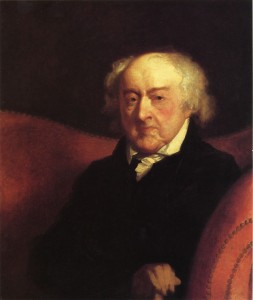 Whatever Adams would think of the way many Americans now turn giddy in the presence of political leaders, Jefferson, Washington, Franklin and Madison would not like it. Jefferson would certainly call foul. This is not the way to maintain a true democratic republic.
Whatever Adams would think of the way many Americans now turn giddy in the presence of political leaders, Jefferson, Washington, Franklin and Madison would not like it. Jefferson would certainly call foul. This is not the way to maintain a true democratic republic.
Treat everyone like aristos, or no one. Period. That’s the only way to be equal and fair.
Don’t treat some like aristos and others like commoners. Because if we do, freedom will quickly decline. (It will decline more for the commoners than the aristos, by the way.) Even Adams hated such obsequiousness when he witnessed it in Europe.
Clearly, as mentioned, the security of top leaders is very important. So is the security of everyone else, but it is true that top officials and celebrities often face more frequent threats. Also, more respect in our civil discourse is needed. But the servile toadying to political celebrity by many in our current populace and even media is a disturbing trend.
Again, we should certainly be respectful of important office. But sycophancy isn’t the American way—as Adams learned when the “commoners” refused to give him a second term. In fact, they instead entrusted the presidency of their nation to the leading voice of democracy and equal treatment for all citizens: Thomas Jefferson.
We should be so wise. Give us a president who stands what matters—boldly, openly, and effectively—while simultaneously rejecting the perks and “airs” of aristocracy, or worse, an Americanized royalty.
Give us a president who vocally reminds us that he or she is just one of the citizens. And who openly remembers and operates on the principle that we, the people, are the real leaders of the nation. It’s time for the media servility and simultaneously smug superiority of the White House to be replaced with what our nation actually needs—quality, grown up, leadership by someone who truly understands what makes freedom tick. The people.
As for the media, focus more on policy and principles, less on ratings and the “royals who lead us.” And none at all on what hotel somebody stays in. There are people with real needs in this country, and current policies are hurting millions of American citizens. Let’s fix them. Starting with spending our media airtime on what really matters.
Category : Aristocracy &Blog &Citizenship &Community &Constitution &Culture &Current Events &Featured &Generations &Government &History &Leadership &Liberty &Mission &Politics &Statesmanship

